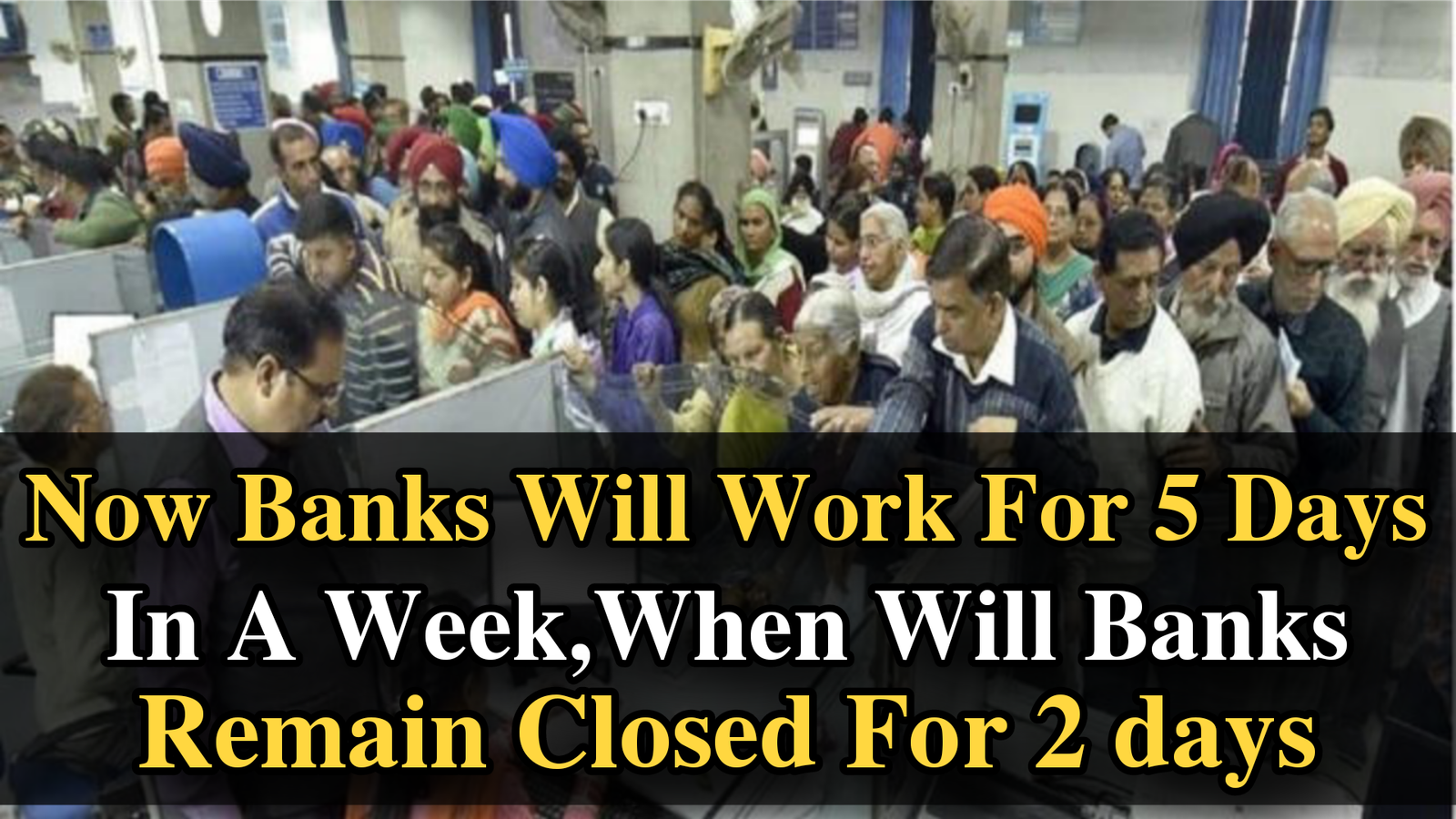Bank Working Days : In a significant development for India’s financial sector, the banking system is preparing to adopt a five-day working week, a move that has been under discussion for years. The Indian Banks’ Association (IBA) and various employee unions have reportedly reached a consensus on the matter, and the implementation of this new schedule appears closer than ever. If approved by the Reserve Bank of India (RBI) and notified by the government, banks across the country will remain closed on both Saturdays and Sundays, effectively reducing the working week to five days. This decision, long demanded by bank employees, will not only alter the working conditions of staff but also bring notable changes to customer service timings and banking operations.
Bank Working Days : Background: The Demand for Five-Day Banking
For nearly a decade, bank employee unions have been pushing for a five-day work week. Currently, banks observe holidays only on the second and fourth Saturdays of each month, along with Sundays. However, unions have consistently argued that the workload, stress levels, and increasing demand for digital services justify reducing physical banking days. Since 2015, several discussions have taken place between unions and the IBA, but concrete implementation had remained uncertain. The signing of a Memorandum of Understanding (MoU) between the IBA and bank unions has finally brought the proposal into the spotlight.
Bank Working Days : The New Proposal: What Will Change?
Under the new framework, all banks will follow a uniform five-day work schedule. This means that every Saturday and Sunday will be declared as official holidays for bank employees. To balance the reduction in the number of working days, the daily working hours are expected to be extended. Reports suggest that banks may open at 9:45 a.m. and remain operational until 5:30 p.m., thereby adding approximately 40 extra minutes to each working day.
Such an adjustment ensures that the overall service hours per week do not drop drastically, maintaining customer convenience while providing employees the much-needed relief of two consecutive holidays.
Bank Working Days : Government and RBI’s Role
The proposal has been discussed with the Reserve Bank of India and requires formal approval from the government before becoming law. For this change to take full effect, amendments will also need to be recognized under the Negotiable Instruments Act, which governs banking holidays in India. Once the RBI and the Ministry of Finance finalize the framework, an official notification is expected to be issued. The government is reportedly optimistic about approving the change within the year, making the transition to five-day banking a near reality.
Bank Working Days : Impact on Bank Employees
The biggest beneficiaries of this reform will be bank employees. Banking jobs are often associated with long hours, high levels of stress, and increasing pressure due to digital transitions and rising customer expectations. Employees have argued that two days of rest will improve their work-life balance, reduce burnout, and enhance productivity during working days.
Moreover, with the banking sector undergoing digital transformation, employees are required to handle not just physical transactions but also back-end operations, compliance checks, customer service through digital platforms, and other critical tasks. The five-day schedule is expected to bring their working conditions in line with global banking practices.
Effect on Customers
For customers, the change means physical branches will no longer be open on Saturdays. While some may worry about reduced access to in-person banking services, the extension of daily working hours will compensate for the reduction in working days. Customers will still have access to online banking, mobile banking apps, ATMs, and other digital payment systems round the clock.
In fact, with the push toward digitalization in India—through initiatives such as Unified Payments Interface (UPI), online fund transfers, and mobile apps—most routine transactions no longer require a visit to the branch. Therefore, the impact on customers is expected to be minimal, while the efficiency of bank staff is likely to improve significantly.
International Comparisons
Globally, many countries already follow a five-day banking week, aligning banks’ schedules with corporate and government offices. In several advanced economies, Saturday and Sunday closures are standard practice, and customers have adapted through digital channels. India, with its fast-growing digital payment ecosystem, is now poised to adopt this system, which would not only modernize its banking structure but also harmonize it with international norms.
Balancing Tradition and Modernization
India’s banking sector has always operated with a dual responsibility: to serve the vast rural population reliant on physical branches, while also keeping pace with urban customers who are rapidly shifting to digital services. The move toward five-day banking reflects this balance. While rural customers may initially face some adjustment challenges, the extended weekday hours and improved staff efficiency are expected to address their needs effectively.
At the same time, this change represents modernization, acknowledging the evolving nature of banking where digital platforms play a dominant role. By offering employees more rest and reducing operational strain, banks can focus more effectively on improving digital services and customer satisfaction.
The Road Ahead
Although the MoU between the IBA and employee unions is a major milestone, the actual implementation will depend on government approval and official notification. Once the Negotiable Instruments Act is amended to recognize Saturday as a holiday, the new system will come into force. Stakeholders across the banking ecosystem—employees, customers, regulators, and policymakers—will need to adapt to the change.
The transition is likely to be smooth given the parallel rise of digital banking. In fact, the timing appears ideal: customers are already comfortable with digital transactions, and the government’s emphasis on cashless payments ensures that physical banking is no longer the only option for financial services.
Conclusion
The decision to move toward a five-day banking week is a landmark step in India’s financial sector. It balances the long-standing demand of employees for better work-life balance with the need to maintain customer service standards. By extending daily working hours, banks ensure that customers do not face major disruptions, while employees benefit from much-needed rest and recovery.
Once the RBI and the government finalize the proposal, Indian banking will officially join global standards of five-day banking. This transition not only marks a change in scheduling but also symbolizes the modernization of the sector, aligning it with digital growth, employee welfare, and international practices. For bank employees and customers alike, this shift represents a positive move toward a more efficient, balanced, and future-ready banking system.



